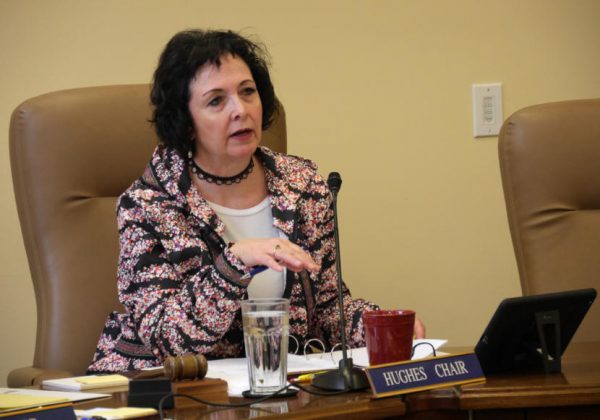
Why hasn’t Alaska solved the problem of what to do about the permanent fund dividend? The answer is pretty simple: A long-term solution faces major political obstacles. Senators who support and oppose reducing dividends say they’re willing to compromise. But they still have major differences.
Palmer Sen. Shelley Hughes left the Republican caucus two years ago in part because the caucus’s rules required her to vote for cuts to the permanent fund dividend that she opposed. She rejoined the caucus last year.
Now, Hughes said she’s willing to compromise.
“I’m going to come off my high horse and come to this midway point, and I hope that some in the other camp would do the same,” she said. “And perhaps we can find a solution. We’ve been wrapped around the axle on this one issue for five years — really, since oil prices dropped.”
Dividends currently are based on roughly half of the average of the previous five years of permanent fund earnings. Hughes proposes instead that they be half of the annual draw. Under a law passed last year, the state draws roughly 5% of the permanent fund’s value each year to pay for the budget and dividends.
In practical terms, that means PFDs would be smaller, about $2,400 per year, in contrast with more than $3,000 under the formula in a 1982 law.
But it would still leave a big gap between how much the state spends and what it brings in — averaging nearly a $1 billion a year for the next eight years, according to the nonpartisan Division of Legislative Finance. That’s smaller than the $1.6 billion average deficit if the state follows the 1982 law, but would still equal more than one-seventh of projected annual state spending.
To compensate, Hughes wants more spending reductions.
“I would propose and support nudging the budget down, little by little,” she said.
But most legislators have resisted Gov. Mike Dunleavy’s plan to close the budget with spending cuts and transfers from local governments after many Alaskans expressed alarm at the deep cuts to public school funding, as well as cuts to health and social services, the university and the ferry system.
Fairbanks Sen. Click Bishop, a Republican, said there’s isn’t much more room to cut the budget. He voted for two bills in past sessions that would have reduced dividends by changing the formula. He’s open to setting the dividend formula at a higher level than those bills would have, including considering Hughes’ proposal.
“Sen. Hughes — she’s willing to compromise. I’m willing to compromise. Absolutely,” Bishop said. He’s the co-chair of the bicameral permanent fund working group, which also has Hughes as a member.
Bishop said new revenue is needed to close the budget gap.
“You can look at the numbers on the split — and where are you going to get the revenue,” he said.
New revenue generally means new taxes, but just like the challenge to passing budget cuts, the Legislature has not embraced new taxes. While the House passed an income tax two years ago, the Senate rejected it. And neither chamber has passed changes to the oil tax system on a scale that would put a large dent in the remaining budget deficit.
The final option for increasing the dividend would be to draw down the state’s savings. This year’s budget is expected to use $272 dollars in savings, and the Legislature is ready to spend up to another $250 million to cover additional costs to fight fires, pay for Medicaid and other expenses.
Bishop said the state shouldn’t draw more from permanent fund earnings than it already has planned.
“I’m not bashful about protecting that at all cost, because I want to guarantee that there be earnings there for future generations — and savings … to continue to pay out dividends,” Bishop said.
The permanent fund working group is planning to lay out its findings in a summary report before the next legislative session.
There’s much work left to do to reach a compromise. That may be difficult to accomplish before lawmakers face elections next year, with voters who have yet to signal they want budget cuts, new taxes, or permanent dividend reductions.
Correction: A previous version of this story misstated the Senate’s reaction to an income tax bill the House passed in 2017. The Senate did not fail to act on the bill, but actively rejected it.
Andrew Kitchenman is the state government and politics reporter for Alaska Public Media and KTOO in Juneau. Reach him at akitchenman@alaskapublic.org.




